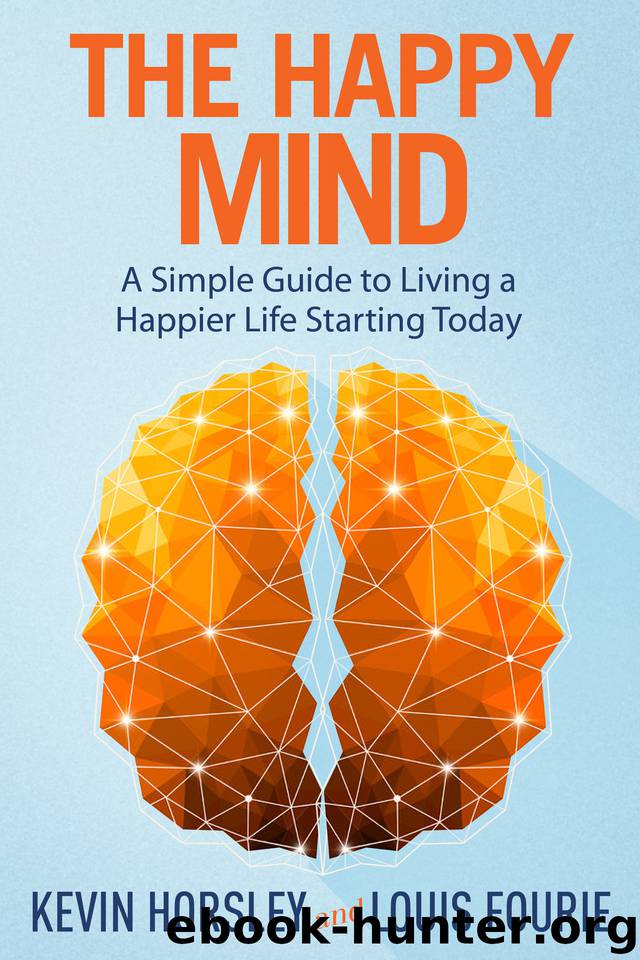The Happy Mind: A Simple Guide to Living a Happier Life Starting Today by Fourie Louis & Horsley Kevin

Author:Fourie, Louis & Horsley, Kevin [Fourie, Louis]
Language: eng
Format: epub, azw3
Publisher: TCK Publishing
Published: 2018-01-02T16:00:00+00:00
Ten Unhappiness Traps
1. Look for the hurt in things
2. Find the enemy in others
3. A poor-me attitude
4. A craving for validation
5. Compare and compete
6. Upsizing life’s imperfections
7. Dramatizing your past
8. Conditional love
9. Trying to change someone
10. Fear-casting the future
(Try to articulate the opposites of these behaviours for your own use)
Failing to keep this basic biological circuitry of fear under control, we believe, is one of the greatest enemies of happiness. These days, what is good for survival is often bad for happiness . To listen to one’s primitive fears in a world that is much more abstract and no longer ‘jungle-friendly’ – and in which survival has become a gentle and mostly symbolic affair – is often disastrous and counter-productive. Our primary stress hormones don’t serve us very well any longer.
Look around you; listen carefully. Do you see and hear the ‘symbolic’ efforts of people to quell their fears of ‘rejection’ and ‘scarcity’? Do you recognize how many people live life almost unconsciously, allowing these ancient forces to dictate how they should fill their days? Their fear of failure leads their thought process and plays a role in many of their important decisions .
Do you understand why people will buy what they cannot afford? Do you realize it is ‘to be accepted’ – or otherwise to temporarily smooth the deep-seated fear of ‘relative scarcity’? There are so many examples of where these fears manifest themselves daily. People will have undesirable relationships, or even suffer abuse, just to feel ‘less rejected’. They will let their reputation suffer in an effort to get hold of more wealth – either to feel more secure or at least to create the image of being resource-rich, and so try to ensure acceptance. Some will even ruin their health in pursuit of wealth. People will consume what their bodies cannot really process, symbolically trying to ‘stamp abundance’ on their lives.
All these and many other modern ways of addressing ancient fears seriously affect people’s personal happiness, because the mismatch causes immense financial, social, and psychological strain.
This ongoing, impulsive reaction to these ingrained fears has nothing to do with a lack of intelligence. It simply happens, irrespective of all the rational reasons why it shouldn’t. And there is an immense urgency to it. It enforces a short-term orientation and knee-jerk responses – and the ‘quick fix’ industries touting pharmaceuticals and sensory stimulation flourish on this urge. They know very well that the therapy effect of immediate satisfaction temporarily alleviates both these calls of nature, and that people don’t ‘calculate’ when they buy when in impulse mode.
“The only thing we have to fear is fear itself.”
— Franklin D. Roosevelt
Responsible long-term decisions will always struggle to hold up to short-term gratification. People’s quest to feel ‘less rejected’ or ‘more affluent’ often limits their good sense.
All of us, unfortunately, carry this genetic backwardness with us; some of us just manage it better – and are therefore happier. In other words, some of us are better equipped to fear less, or have consciously steered ourselves away from these primitive urges.
Download
The Happy Mind: A Simple Guide to Living a Happier Life Starting Today by Fourie Louis & Horsley Kevin.azw3
This site does not store any files on its server. We only index and link to content provided by other sites. Please contact the content providers to delete copyright contents if any and email us, we'll remove relevant links or contents immediately.
Becoming Supernatural by Dr. Joe Dispenza(8217)
Crystal Healing for Women by Mariah K. Lyons(7930)
The Witchcraft of Salem Village by Shirley Jackson(7274)
Inner Engineering: A Yogi's Guide to Joy by Sadhguru(6794)
The Four Agreements by Don Miguel Ruiz(6765)
The Power of Now: A Guide to Spiritual Enlightenment by Eckhart Tolle(5781)
Secrets of Antigravity Propulsion: Tesla, UFOs, and Classified Aerospace Technology by Ph.D. Paul A. Laviolette(5371)
The Wisdom of Sundays by Oprah Winfrey(5161)
Room 212 by Kate Stewart(5121)
Pale Blue Dot by Carl Sagan(5008)
Fear by Osho(4740)
The David Icke Guide to the Global Conspiracy (and how to end it) by David Icke(4719)
Animal Frequency by Melissa Alvarez(4472)
Rising Strong by Brene Brown(4459)
How to Change Your Mind by Michael Pollan(4356)
Sigil Witchery by Laura Tempest Zakroff(4246)
Man and His Symbols by Carl Gustav Jung(4135)
The Art of Happiness by The Dalai Lama(4130)
Real Magic by Dean Radin PhD(4129)
